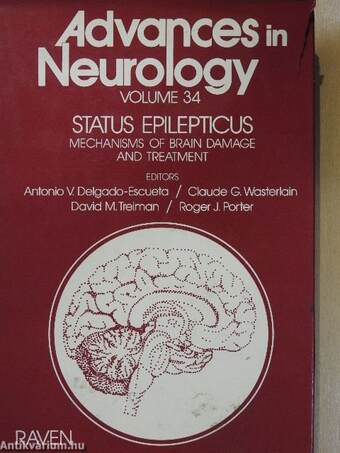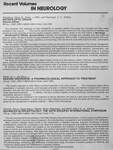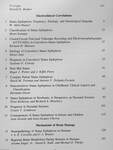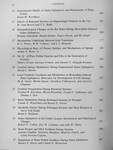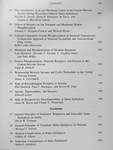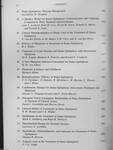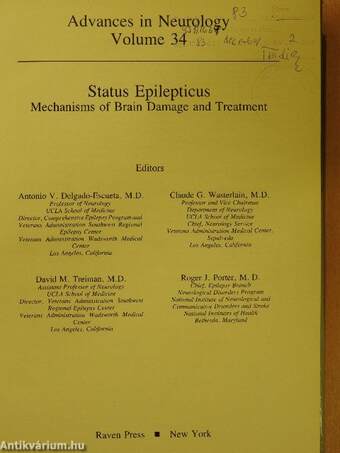1.067.017
kiadvánnyal nyújtjuk Magyarország legnagyobb antikvár könyv-kínálatát

VISSZA
A TETEJÉRE
JAVASLATOKÉszre-
vételek
Status Epilepticus
Mechanisms of Brain Damage and Treatment
| Kiadó: | Raven Press |
|---|---|
| Kiadás helye: | New York |
| Kiadás éve: | |
| Kötés típusa: | Fűzött kemény papírkötés |
| Oldalszám: | 551 oldal |
| Sorozatcím: | Advances in Neurology |
| Kötetszám: | 34 |
| Nyelv: | Angol |
| Méret: | 26 cm x 18 cm |
| ISBN: | 0-89004-623-9 |
| Megjegyzés: | További szerző a kötetben. Fekete-fehér fotókkal, illusztrációkkal. |
naponta értesítjük a beérkező friss
kiadványokról
naponta értesítjük a beérkező friss
kiadványokról
Fülszöveg
Recent Volumes
IN NEUROLOGY
Woodbury, Dixon M., Penry, J. Kiffin, and Pippenger, C. E., Editors:
ANTIEPILEPTIC DRUGS
Second Edition
899 pp. (1982) ISBN 0-89004-498-8 (Order Code 556)
"Any physician who proposes to treat intelligently an epileptic patient must grasp the concepts and facts made
available in this volume. . . . This volume should become the standard reference in the drug treatment of epilepsy and
should be at the fingertips of anyone treating epileptic patients."—from a review of the First Edition in Neurology.
ANTIEPILEPTIC DRUGS, Second Edition maintains the methodical coverage and readable style that made the
previous edition the text of choice on drug treatment of the epilepsies. With a roster of distinguished experts from such
fields as pharmacology, neurology, pediatrics, and toxicology, this volume is an unexcelled source of clear, authoritative
information for all clinicians.
This new edition has been thoroughly revised to bring you the most... Tovább
Fülszöveg
Recent Volumes
IN NEUROLOGY
Woodbury, Dixon M., Penry, J. Kiffin, and Pippenger, C. E., Editors:
ANTIEPILEPTIC DRUGS
Second Edition
899 pp. (1982) ISBN 0-89004-498-8 (Order Code 556)
"Any physician who proposes to treat intelligently an epileptic patient must grasp the concepts and facts made
available in this volume. . . . This volume should become the standard reference in the drug treatment of epilepsy and
should be at the fingertips of anyone treating epileptic patients."—from a review of the First Edition in Neurology.
ANTIEPILEPTIC DRUGS, Second Edition maintains the methodical coverage and readable style that made the
previous edition the text of choice on drug treatment of the epilepsies. With a roster of distinguished experts from such
fields as pharmacology, neurology, pediatrics, and toxicology, this volume is an unexcelled source of clear, authoritative
information for all clinicians.
This new edition has been thoroughly revised to bring you the most up-to-date advances in the clinical management
of seizure disorders. The genera! principles introductory section features four new chapters: • practical pharmacokinetics
• principles of action—structure-activity relationships and mechanisms • experimental detection, quantification, and
evaluation of anticonvulsants, and • experimental quantification and evaluation of anticonvulsant drugs in a primate
model. Additional highlights of the book include an entire section on carbamazepine, full treatment of valproate, expanded
discussion of benzodiazepines, and information on potential anticonvulsants such as eterobarb, cinromide, mexiletine,
and GABA receptor agonists.
The drugs are presented in the same easy-to-follow format as in the previous edition: chemistry; absorption, distri-
bution, excretion; biotransformation; interactions with other drugs; plasma concentration and seizure control; and toxicity.
Each chapter includes helpful notes, and a functional index is provided at the end of the book.
All clinicians working with epileptic patients will find this book to be a convenient, informative resource, helpful in
everyday practice, and essential in the development and administration of successful, long-term therapeutic programs.
Wilder, B. J., and Bruni, J.
SEIZURE DISORDERS: A PHARMACOLOGICAL APPROACH TO TREATMENT
256 pp. (1981) ISBN 0-89004-539-9 (Order Code 1004)
"The modern approach is what Wilder and Bruni describe in this small volume. . . . The monograph begins with a
classification of epileptic seizures, pharmacologic principles of medical therapy, and medical management of seizure
disorders. The next and most useful part of the book is a description of the pharmacologic properties of commonly and
rarely used anticonvulsants. .In addition, the book contains chapters on drug monitoring, interactions, toxicity, and
quantitative laboratory analysis. . . .
"For those who are uninitiated in the treatment of seizure disorders, this book is a gold mine of information. . . .For
more experienced physicians, it could serve as a quick reference source when they are faced with the many questions
posed by the management of epileptic patients. "¦—Mayo Clinic Proceedings
Akimoto, Haruo, Kazamatsuri. Haiime, Seino, Masakazu, and Ward, Arthur A., Jr., Editors:
ADVANCES IN EPILEPTOLOGY: THE XIIITH EPILEPSY INTERNATIONAL SYMPOSIUM
750 pp. (1982) ISBN 0-89004-798-7 (Order Code 1114)
This volume presents the proceedings of the Xlllth Epilepsy International Symposium, a broad-ranging multidisciplinary
exchange devoted to the most recent progress in the understanding, management, and rehabilitation of the epilepsies.
Major sections highlight recent trends in the classification of epileptic seizures, long-term monitoring of seizure
manifestations, prevention of epilepsy in the infant and neonate, and prognosis and treatment of myoclonic seizures
in childhood. Chapters provide new insights on the precipitation and inhibition of epileptic seizures, the biochemical
bases of human and experimental epilepsy, and cerebral lateralization in epileptic manifestations, and formulate new
experimental models of epilepsy. New diagnostic approaches presented include metabolic studies, radiopharmaceu-
ticals, computer analysis of prolonged EEG's, brain electrical activity mapping, localization of epileptogenic spike foci,
and new applications of computed tomography. The relationship of epilepsy and its therapy to behavior is considered
in detail, including chapters on siattis epilepticus and psychosis, acoustic reaction time in epileptics, clobazam and
cognitive functions, manic episodes in epilepsy, and emotional responses in the epileptic patient. Other sections discuss
the pharmacology, monitoring, and withdrawal of antiepileptic drugs, the effects of parental epilepsy on offspring, and
community efforts toward the rehabilitation of epileptic patients.
This volume will be of interest to all neurologists and neuropharmacologists. Vissza
Témakörök
- Idegennyelv > Idegennyelvű könyvek > Angol > Orvostudomány
- Orvostudomány > Általános orvosi, egyéb > Idegennyelvű
- Orvostudomány > Általános orvosi, egyéb > Kutatások, kísérletek
- Orvostudomány > Gyógyszertan > Gyógyszerkészítmények > Egyéb
- Orvostudomány > Gyógyszertan > Gyógyszertan
- Orvostudomány > Gyógyszertan > Idegennyelvű
- Orvostudomány > Ideg, elme > Diagnosztika
- Orvostudomány > Ideg, elme > Idegennyelvű
- Orvostudomány > Ideg, elme > Neurológia
- Orvostudomány > Ideg, elme > Terápia
- Orvostudomány > Orvosi idegennyelvű könyvek > Általános orvosi
- Orvostudomány > Orvosi idegennyelvű könyvek > Gyógyszertan
- Orvostudomány > Orvosi idegennyelvű könyvek > Ideg, elme



